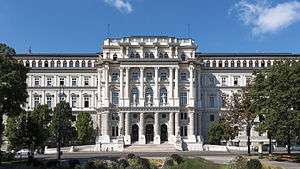2015 Vienna swimming pool rape
On 2 December 2015, at the Theresienbad swimming pool in the Austrian capital Vienna, a 10-year-old boy was raped. The perpetrator, an Iraqi refugee who had arrived in the country two months earlier, claimed that he was motivated by not having sex for four months.
The crime became public knowledge in February 2016, and in June the man was sentenced to a minimum six years in jail. In October, the Supreme Court of Austria overturned his rape conviction and ordered a retrial. In May 2017, the man's sentence was reduced to four years.
The crime was one of several at the time which led to anti-refugee sentiment in Austria, and the overturning of the original conviction was condemned by Russian president Vladimir Putin.
Background and incident
The perpetrator was born in Iraq and had arrived in Vienna in September 2015, finding work as a taxi driver.[1][2]
The victim, known as Goran, is the son of a Serbian refugee.[2]
The man raped the boy in a toilet room cubicle, causing physical injury, and then went diving.[1] Goran told a lifeguard and the man was arrested.[2]
Legal proceedings

The crime was not made public knowledge until February 2016, with the police giving the reason as to protect the victim.[1] Thomas Keiblinger, spokesman of police in Vienna, denied that the incident had been covered up because the perpetrator was a refugee.[1]
The perpetrator said that he had not had sex for four months as his partner had been ill since giving birth, so he "followed his desires" because he had "a marked surplus of sexual energy" and knew that his act would be illegal in any country of the world.[1] His defence lawyers mentioned his youth, living conditions and clean prior criminal record in mitigation.[2]
In court, it was heard that Goran had been profoundly disturbed by the crime, and was considering suicide. His family was awarded €4,700 in compensation.[2] The man was sentenced to six years in prison in June 2016, with a maximum 15 years, and possible deportation at the end.[2]
In October 2016, the Austrian Supreme Court overturned the man's conviction of rape, while upholding his second charge of aggravated sexual assault of a minor. The rationale was that the prosecution had not provided evidence that the man did not know that his victim did not consent. The man was kept in police custody until his retrial.[3]
In May 2017, judge Thomas Philipp reduced the sentence to four years in a final decision by the Supreme Court, saying that the rape was a "one-off incident" and "you cannot lose your sense of proportion here".[4]
Reaction
The crime led to a rise in anti-refugee sentiment in Austria.[2] The New York Times mentioned it and the gang rape of a grandmother in Traiskirchen as incidents that were causing a growth in support for the Freedom Party of Austria candidate Norbert Hofer in the 2016 election.[5]
Vladimir Putin, the president of Russia, spoke after the original conviction was overturned, a rare comment by him on the refugee crisis. He said "It doesn’t fit into my head what on earth they’re thinking over there. I can’t even explain the rationale – is it a sense of guilt before the migrants? What’s going on? It’s not clear. A society that cannot defend its children has no future".[3]
References
- 1 2 3 4 5 "Iraqi migrant admits raping boy in Austrian pool after having 'too much sexual energy'". Telegraph. 6 February 2016. Retrieved 11 November 2016.
- 1 2 3 4 5 6 7 "Iraqi refugee who raped 10-year-old boy at swimming pool in Austria jailed for six years". Independent. 15 June 2016. Retrieved 11 November 2016.
- 1 2 "Vladimir Putin claims decision to overturn child rape case conviction 'dilutes national values'". Independent. 3 November 2016. Retrieved 11 November 2016.
- ↑ "Bub vergewaltigt - Iraker kommt in Kürze frei!". Kroner Zeitung (in German). 23 May 2017. Retrieved 20 July 2018.
- ↑ "Migrant Crimes Add Volatile Element to Austria's Election". New York Times. 21 May 2016. Retrieved 11 November 2016.